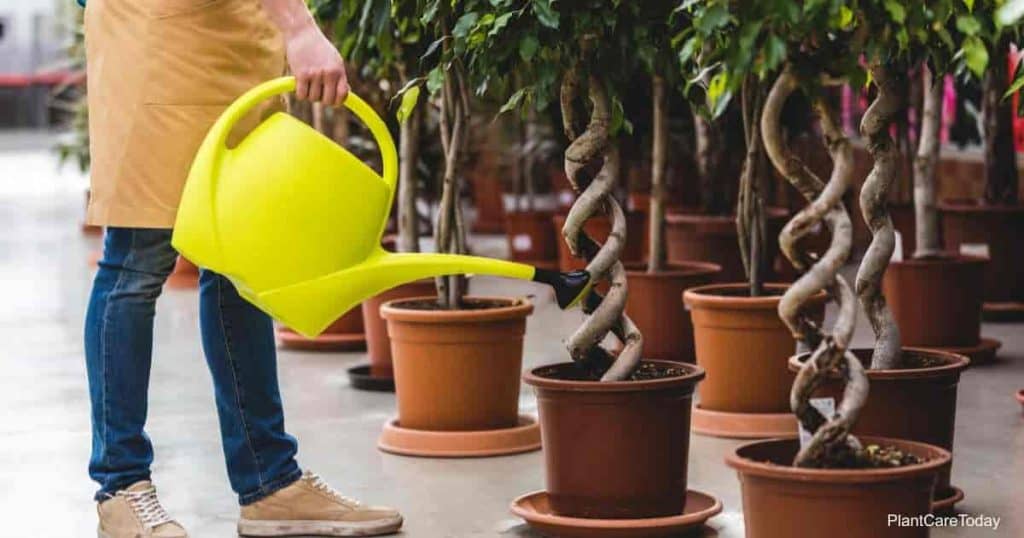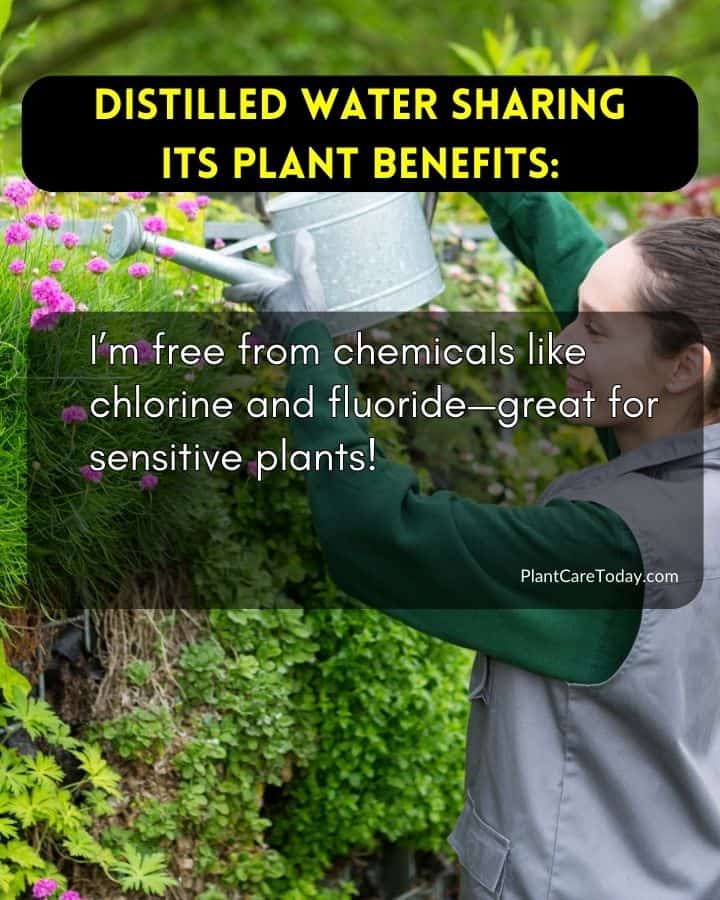These days, it’s becoming harder and harder to get pure water for your houseplants.
Tap water or municipal water often contains unwanted contaminants. Even rainwater is less than perfect.

We get questions all the time – Can you use distilled water for plants?” “Is distilled water good for plants?”
What can you do?
In this article, we discuss using distilled water for plants and explain how to make your own if you are so inclined.
Read on to learn more.
What Is Distilled Water?
Distillation is the process of condensation and evaporation to assist in removing chemicals and minerals from water.
It’s just hydrogen and oxygen.
Distilled water is completely pure and free of these substances, like bacteria, viruses (and nutrients), and many people think it’s better for plants.
This is especially true of indoor plants with a small amount of soil badly contaminated with chemicals and mineral content buildup.

Is purified water the same as distilled water for plants?
Purified water is not necessarily the same as distilled water when watering plants.
While both types of water undergo a purification process, distilled water undergoes a specific distillation process to remove impurities, minerals, and other contaminants, leaving behind pure H2O.
Purified water can encompass various purification methods, such as reverse osmosis, carbon filtration, or deionization. However, purified water may retain some minerals and other substances beneficial for plants.
What Makes Distilled Water A Different Kind Of Water?
Tap water from your kitchen water faucet surely contains fluoride, chlorine or chloramine, and other harmful chemicals used for water purification.
Unfortunately, these chemicals are very bad for plants.
NOTE: Many greenhouses and hydroponic systems use water filters to clean water before irrigating their crops.
Outdoor plants can handle some chemical impurities in the water because their effects are diluted by rain, but houseplants must simply use the water you give them.
If the water always has chemicals in it, these will build up in the soil over time.
Tap water and well water are often hard types of water. Hard water is water full of minerals or heavy metals.
Much debate goes on asking – is hard water bad for plants?
There are some plants (e.g., the Venus Flytrap) that are unable to tolerate this.
Hard water is difficult for people to deal with because it interferes with the efficacy of shampoo, soap, and detergents.

It damages appliances and leaves stains in the sink, tub, and shower.
The solution to these problems is to install a water softener, but this is not a good idea for water used for plants.
Water softeners work by adding salt, creating salt water, which will kill your plants. A reverse osmosis system is another option.
Softened water is low in calcium, magnesium, and potassium.
Do Plants Grow Better With Tap Water or Distilled Water?
Distilled water is a soft type of water but is not made soft by adding sodium.
Instead, it is made soft by the elimination of chemicals and minerals.

Can You Water Plants With Distilled Water?
Now, you might ask, is distilled water better for plants?
Many people use tap water for plants and find it is all right. However, some plants cannot tolerate the minerals and chemicals they contain.
In side-by-side comparisons, plants watered using distilled water tend to grow faster and stronger than tap water. We find it the “Best Water for Indoor Plants.”
Plants watered with distilled pure water usually produce more leaves and grow more vigorously.
Even so, it’s important to remember that distilled water for plants only adds hydration. It doesn’t add any nourishment at all.

If you are watering plants with distilled water, you must take great care to fertilize your plants according to type.
Now, you might ask, is distilled water bad for plants? Or will distilled water kill plants?
Distilled water will not directly kill plants, but using it exclusively for all your plants may not be ideal in the long run.
Distilled water lacks minerals that plants need for their growth and development. Therefore, solely using distilled water for prolonged periods could lead to nutrient deficiencies in your plants, affecting their health and growth.
It’s important to strike a balance when watering plants.
It’s advisable to provide plants with a mix of water sources to ensure optimal growth.
You can use tap water, rainwater, or well water that has been tested for quality, along with occasional use of distilled water.
Mixing water sources will help balance essential nutrients while minimizing the risk of accumulated salts or chemicals in the soil.
Why Is Distilled Water The Best Water For Plants?
Some people water their houseplants with tap water left to stand overnight.
This is because chemicals tend to evaporate from the water as it stands.
Unfortunately, excessive minerals will not evaporate from the water.
Another option for watering plants is to use melted snow, fish tank, aquarium water, or rainwater.

Rainwater is full of minerals necessary for plant growth. It also contains high oxygen levels that lead to larger root mass and faster intake of nutrients.
Generally speaking, this water is chemical-free, natural, and free of heavy metals. However, if you live in an area with a lot of industrial activity or heavy traffic, rainwater and snow are not pure and may be very acidic.
Distilled pure water is chemical and mineral-free and usually has a neutral pH level. This makes it ideal for the regular watering of houseplants.
How To Make Distilled Water For Plants?
The distillation process and distilling at home is an intensive, costly, and potentially dangerous process.
Generally speaking, you’re probably better off purchasing distilled bottled water for about a dollar a gallon at your local market.
If you do want to make distilled clean water on your own, here’s what you’ll need:
- One large pot with a lid
- One small heatproof container capable of fitting inside a stainless steel pot
- One block of ice
Here’s how to distill water for plants:
- Fill the large pot about halfway with tap water.
- Float the smaller container on the water in the pot.
- Put the lid on the pot upside down.
- Put the block of ice on top of the upturned lid.
- Place the pot over a medium-high flame.
- Bring the water to a low boil.
- Reduce the heat to keep the water at a simmer.
- Keep a close eye on this setup and empty the melted water from the top of the upturned lid carefully, as needed.
As the steam rises from the water, it will collect on the cold lid and drip into the floating container.
The water collected in the container is distilled.
This method of water distillation is demonstrated in this video.
It’s worth noting although all instructions and this video call for the use of a block of ice, the ice is actually unnecessary.
The boiling water will condense on the underside of the lid and drip into the receptacle without the ice.
Note: It’s important to ensure the safety of the distillation process and use appropriate equipment to avoid any accidents or damage.
Is DIY Home Distilled Water Worth The Trouble?
As the video above and the two below demonstrate, making distilled water at home is a costly, time, and resource-intensive activity.
Creating an amount of water equal to 16 oz will take you 2 hours.
It takes 1.5 hours to make a quart of water.
In light of this, it’s safe to say, generally speaking, if you want to use distilled water on plants for your garden, you are much better off simply buying spring water at the grocery store instead of using your own water distiller.
